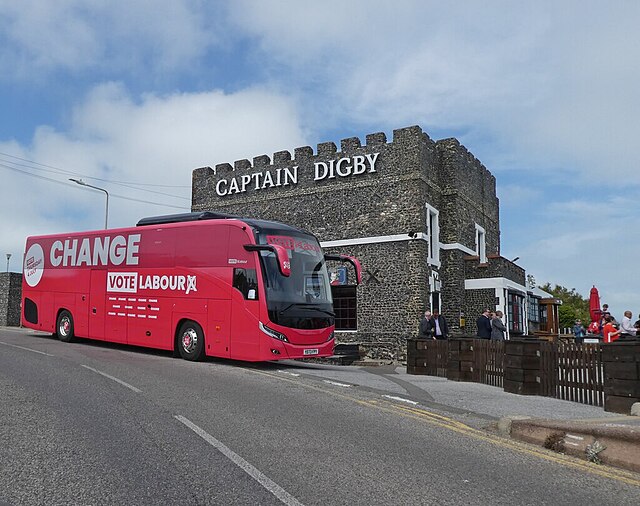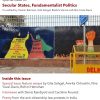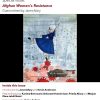Feminist Dissent begins by noting a sense of huge relief at the scale of the victories against the Conservatives. We share the revulsion that so many felt toward the Tories (particularly the most recent administration), which saw public services literally run into the ground while leading members of the government reiterated the racist conspiracy theories of the extreme right. To see this blatant strategy of social division, and many of the key figures associated with it, so soundly rejected by the electorate was not just important, but deeply gratifying. At the same time, there are some crucial caveats to this good news–the electoral turnout was a record low, pointing to how disengaged many people feel from the whole political process. It is clear that while there is vast anger against what the Conservatives have done to the UK through their destructive and divisive social and economic policies, it is unclear how much of this will actually change under Labour. Unlike the conditions of the last Labour landslide in 1997, the UK is poorer, more divided, and desperately in need of rebuilding in terms of its economy, public services and especially its democratic institutions, which have been so deeply tarnished by the last Tory government. Labour has a mandate for change, but how much of this will it institute?
In this discussion we do not want simply to reiterate the political critiques of Starmer that have been made by many left, feminist, and anti-racist groups. Instead, we want to focus on some key issues that most of those commentaries have not addressed, as well as to think about the opportunities for intervention that the current situation offers a left feminist anti-racist political movement.
The communalisation of the electorate: identity politics in the election
One of the paradoxes of the last government was that it was the most diverse yet seen in Britain, and at the same time, it was ideologically the most racist. How do we make sense of seeing a British Asian Home Secretary whose parents were migrants to Britain championing the removal of asylum seekers to Rwanda and describing them as an invasion? Many on the left have responded with perplexity to this, as though these people were somehow betraying something. However, if we look at this in the context of the political communalisation of ethnic minority identities, it makes sense. One of the most significant features of this election, rarely commented on in mainstream media sources, was the extent to which South Asians are now being called upon to vote along religious rather than class lines; they are being appealed to vote as ‘Muslims’, ‘Hindus’ and ‘Sikhs’.
The communalisation process has been quietly going on for some time. During the 2019 election, Conservatives sought to use religious scare tactics to appeal to Hindu voters. Hindutva forces had previously produced videos in support of David Cameron in Britain and Donald Trump in the US. What was most notable in this election was the sheer confidence with which South Asian religious “vote bank” politics was asserted in the public domain, and the way these groups demanded that politicians sign up to their agendas. This reflects a broader growth of the role of identity politics – which is seen not only through the religious vote in minority communities but also with the white nationalist identity politics represented by Reform, another major winner in this election.
In terms of the religious vote in Muslim communities this has largely been reported in the press in terms of a ‘pro-Gaza vote squeezing Labour majorities’. In the case of Jonathon Ashworth in Leicester South, this led not just to cutting some Labour majorities but the removal of a sitting Labour MP in what is considered a ‘safe’ seat. But what has been commented on less is the role of religious identity politics and the fundamentalist groupings that are organising in this political space.
‘The Muslim Vote’ organisation clearly manifests this process. It campaigned strongly for ‘peace in Palestine’ against the pro-Israeli positions shown in Labour’s initial refusal to support a ceasefire in Gaza. This group’s members sought to garner support for different ‘independent’ Muslim candidates and to situate themselves within an overall campaign claiming that they are the ‘largest Muslim political campaign ever set up in the history of the British Muslim community’. With slogans such as ‘peace in Palestine, equality in the UK’, such groups seem to have positions many progressive people would support.
However, we should be under no illusions that this represents a major attempt to reconstitute political allegiances first and foremost on a religious basis. This is not just about the significance of ‘cultural identities’ as many might think. Rather it represents a process in which the communities are policed into accepting fundamentalist norms and outsiders are required to accept these leaders as legitimate or sole spokespeople. This process has major implications for the position of women, girls, and sexual minorities in those communities – and it is also very significant for how it completely displaces questions about people having common interests across religious boundaries such as affinities as workers or as women.
While Muslim religious leaders can position themselves alongside progressive anti-war figures like Jeremy Corbyn on the issue of Palestine, their wider political agendas are more regressive than the traditional patriarchal norms already present in those communities. The Muslim Vote group is backed by MEND and the Muslim Association of Great Britain (MAB) – which both represent this form of fundamentalist politics. For example, both of these groups have argued for definitions of ‘Islamaphobia’ that conflate legitimate criticism of Islamic doctrine with racism, creating a de facto blasphemy code. They have actively campaigned to introduce an authoritarian form of religious politics in education (promoting gender segregation in schools and opposing Relationships and Sex Education) and in social policy more generally (where they have championed initiatives like religious courts).
Within Muslim communities these groups actively silence dissenting voices, particularly those of women and girls. Media reports have discussed issues of intimidation in the election. But what these reports have not discussed is the way these were most aggressively directed against secular female Labour MPs such as Rushanara Ali (Bethnal Green and Stepney), Shabana Mahmood (Birmingham Ladywood) and Jess Phillips (Birmingham Yardley). The latter is significant in that – unlike many other Labour MPs who have also faced hostility because of Labour’s initial refusal to criticise Israel – Jess Phillips had already quit the Labour front bench in protest against the party’s stance on this.
On the other side of the religious vote camp, Hindus have mobilised for the Hindu vote using a Hindu Manifesto and have held hustings in Hindu temples up and down the country. This manifesto makes a series of demands. The most serious of these demands calls on Keir Stammer to clamp down on hate crimes against Hindus, which has been described as ‘Hinduphobia’, although there is no evidence of its prevalence in the UK. As with the promotion of Islamophobia, Hinduphobia was coined to carve out a space for Hindus to project an idea of Hindu victimhood that is linked very much to the Hindu nationalist agenda under the current Indian prime minister Narendra Modi.
In this way the agenda for the recognition of religious or faith-based communities is driven by right wing forces that are globally connected. For example, the Hindu Manifesto is supported by Hindutva forces such as the Hindu Forum of Great Britian, Hindu Council UK, National Council of Hindu Temples and others that have been mobilised as part of Modi’s attempt to capture the Indian Hindu diaspora. These are the same organisations that successfully opposed the introduction of anti-caste discrimination legislation in the UK and have been mobilising around demands for faith-based schools, the inclusion of ‘Hinduphobia’ in social policy and public discourse and stringent immigration controls – presumably to project themselves as a law-abiding and well-integrated minority community compared to illegal new migrants and ‘undeserving Muslims’.
In similar terms a Sikh Manifesto was launched on 7 June, largely aimed at Labour – which most Sikhs still support. But like the others, it promotes a political Sikh Khalistani identity and makes demands of the UK to declassify Khalistani groups as terrorists. Interestingly, the document makes no mention of the groups behind this initiative and so is less transparent than the others.
Leicestershire has been one of the places where this communalisation of the electorate has played out most fully. On one hand in Leicester South, the independent Muslim Shokat Adam removed Labour’s Jonathon Ashworth. Yet on the other side of the city, it was deeply ironic that the only Conservative gain from Labour in the entire election was in Leicester East where Shivani Raja took the seat from Labour for the Conservatives – the first time in 37 years that this constituency has elected a Tory. Shivani Raja ran her campaign on a thoroughly communal basis, positioning herself as a Hindu Gujarati rather than Asian. Outside Leicester city itself, Lee Anderson – who had defected to Reform from the Conservatives – won for Reform the Ashfield constituency, historically an ex-mining safe Labour seat. Anecdotal accounts from minority communities in Leicestershire are now saying that Ashfield is “a no-go area for non-white people”. There has also been evidence that the far right’s work in associating Asians with grooming gangs in Rotherham has also had an impact in this constituency, reflecting the power of this issue in mobilising people.
What we are seeing here is a consolidation of identity politics as force within a range of constituencies in Britain. While the political agendas of these identities are different and expressed differently in Muslim, Hindu or white nationalist rhetoric, they are all mirror images of each other in that each identity is positioned in opposition to an ‘establishment’ that is ‘not listening’ to a disregarded and victimised constituency. At a time when there is such distrust in democratic institutions and so many people feeling insecure about what the future offers for them and their families, identity politics speak to people’s fears and anxieties – but in the reactionary language of an ethnic zero-sum contest, with different groups pitted against each other. The forms of political mobilisation they offer will only empower the most reactionary and chauvinistic forces within all of these communities and promote blame, othering and racism. The political agendas they offer fail to address any of the real problems that people are facing, because these are problems that exist across the board: housing, the cost of living, insecure work and the poor state of public services. What we require here are political campaigns that bring people together on the basis of need and offer a broad progressive agenda, rather than a preoccupation with victimised cultural identities.
Labour’s limitations
While those on the left are rightly concerned about the danger of the rise of a white supremacist nationalist right with its deep racism toward Muslims, the left shows an ongoing tendency to collapse the broader manifestations of racism into anti-Muslim racism only. As we have noted in the past, this has created the basis of alliances between the left and Muslim fundamentalists. The question of how to create an alternative is a major issue for a secular anti-racist feminist left, and this is not going to come from Labour or from the many sections of the left that have uncritically supported groups like MEND and Cage. Labour will also be concerned about the electoral upsets caused by independents in areas with large Muslim populations and this may give the Labour leadership even more of a rationale to cosy up to minority religious leaderships in an effort to ‘regain trust’. It was of course under the last Labour government of Tony Blair that ‘multi-faithism’ really took off, and it likely that this sort of approach will return under the Starmer leadership.
The issue of immigration was raised extensively by the Tories and Reform in the election, and there are sections of the electorate that have bought into arguments once found primarily from far-right groupings that immigration is undermining Britain and ‘British identity’. Labour obviously needed to respond to this, but what the party has offered is deeply disappointing. Keir Starmer’s proposal, one of his six election pledges, is to create a ‘Border Security Force’ that will seek to ‘break the trafficking gangs’. It is a policy bound to fail because it does not recognise that the power of trafficking gangs is predicated on the absence of safe and legal ways to migrate to the UK. Not only has Labour not made the case for safe migration out of fear of attack by the press and right-wing groups and supposedly rendering itself electorally unpopular, but it has used the same language as the right – accepting that immigration per se is as a problem that needs to be reduced. In doing so Labour has only given Reform a stick to beat it with.
It is significant to note that while Reform won four of five seats from the Tories, it came second in 89 Labour constituencies, many in declining industrial areas of the North, Northeast and Midlands. At the same time, it is important to recognise that unlike the situation in France, the extreme right is under-developed in the UK. Reform barely exists as an organised political movement despite the high number of votes it gained. There also appears to be ongoing divisions between the Conservatives and those further to the right. Suella Braverman, who at one point was viewed as a leader who could unite different sections of the right within the Conservative Party, now appears less popular than she once seemed to be. While the right has a powerful card to play in manipulating fears about immigration, it is still organisationally weak and the question of who will lead and offer direction for the Conservatives in the post-election period is still in play.
Spaces for feminist intervention?
There is a deep irony to Labour’s deselection of Faiza Shaheen in the run up to the election since she, more than any of the independent Muslim candidates, put forward an avowedly secular Muslim voice. Some of us had involvement in her campaign and noted the range of different constituencies she brought together. It is significant that in four weeks this campaign got as many votes as Labour, thereby depriving Labour of what should have been an easy win. This affair points to the opportunities that progressive forces still have in developing the kinds of progressive mobilisation that speaks to a more hopeful and egalitarian vision of Britain and most significantly, is not tied to the forms of identity politics discussed earlier. Despite the loss of this electoral campaign, the coalition of forces that came together here aim to continue this work.
While recognising Labour’s limitations, it is also important to recognise that Labour governments have done valuable things on the edges of social policy, particularly around questions of social rights. It will be important to think about how we orient ourselves toward these and demand more from them. There are likely to be spaces where Labour might adopt pieces of policy that we would support or waver on policies we think it should be supporting. What for example will be Labour’s approach to education and the role of religious groups within that? Where will Labour stand on questions like the introduction of Relationships and Sex Education, and the ongoing development of religious courts that pose a direct threat to minority women’s rights? Will we see new approaches to the issue of violence against women and girls – an issue that gets more and more severe? Spaces for feminist and anti-racist intervention are likely to emerge in relation to events on the ground. While remaining critical, Feminist Dissent also sees it as important to be alert to these opportunities as they arise and try to influence policy where we can.









.jpg)

